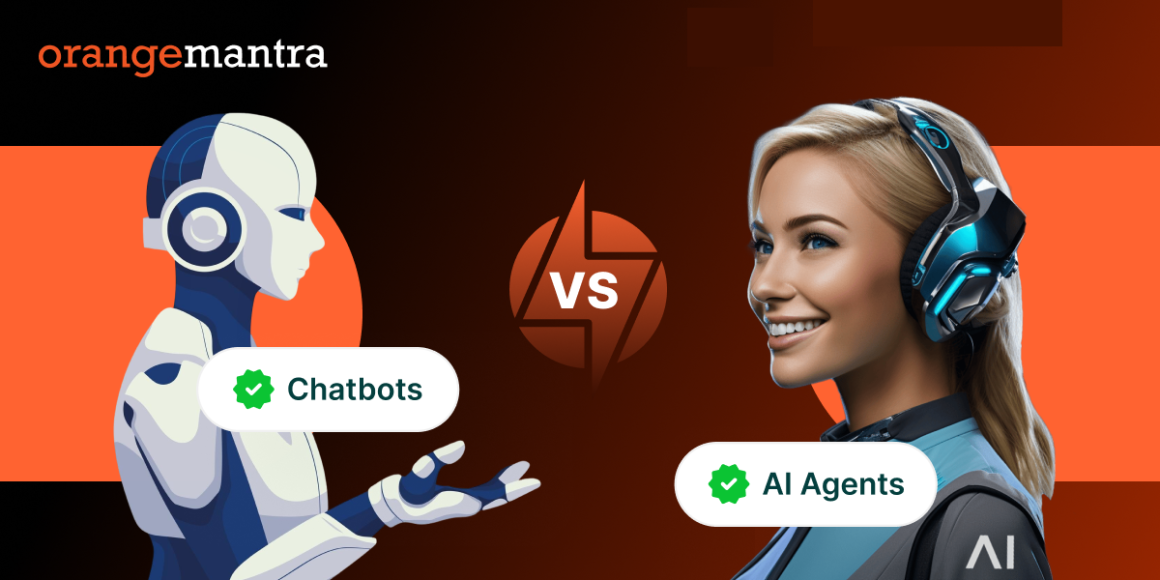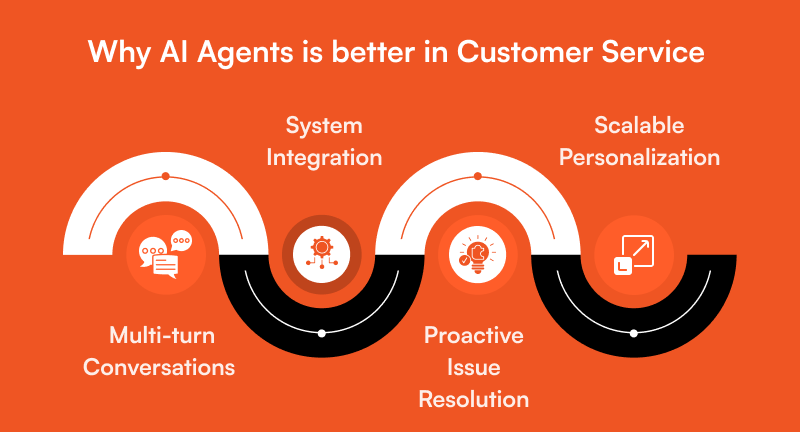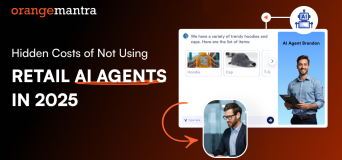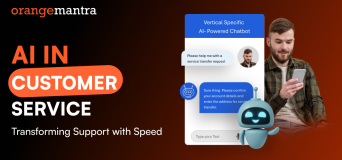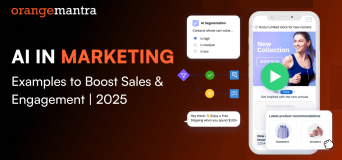Back in my college hostel days — before the pandemic hit — we’d team up and battle it out for hours in games like Call of Duty and Modern Combat. The worst insult you could get after losing? “You’re such a bot.”
Being called a bot meant you were predictable, basic, and not up to the mark. Fast-forward to 2025, and funny enough, we’re still dealing with bots — but this time, they’re handling customer queries on websites and apps.
And let’s be honest: they still feel kind of basic.
But we’re witnessing a shift in 2025. AI agents in customer services are emerging as the smarter and more adaptable evolution. They are offering better answers and fundamentally better experiences. AI agents are a whole new league.
This article is an endeavor to share some insights and opinions on AI agents vs chatbots. We will also try to explain why AI agents are starting to surpass chatbots and why this shift is more than just a tech upgrade.
What is the Real Difference Between AI Agents and Chatbots?
Chatbots and AI agents might seem similar at first glance. They both interact with users via chat interfaces. But the core difference between AI agent and chatbot is how they operate.
- Chatbots are rule-based. They rely on scripts or decision trees. If a user’s input doesn’t match the script, the bot fails.
- AI agents are autonomous and context aware. They can understand intent, learn from previous conversations, and make decisions on the fly – even in new situations.
Let’s take an example. A chatbot might answer, “I didn’t understand that. Please try again,” when faced with an unfamiliar question. But a customer service AI agent, on the other hand, would attempt to analyze the input, search your knowledge base, or ask clarifying questions to find a meaningful solution.
Key AI agents vs chatbots distinction: AI agents are goal-oriented, whereas chatbots are task-oriented. This difference impacts how each performs in real-world support environments.
Why AI Agents Deliver Better Outcomes in Customer Service?
Business customer service has its own complexity. Be it technical products, custom pricing, longer decision cycles, and multiple stakeholders. Here’s where AI agents in customer service shine.
Multi-turn Conversations
AI agents can handle long conversations without getting confused. They are not there to just reply but they also remember what you said earlier.
Let’s say a customer asks about product compatibility in a few different messages. Instead of starting from scratch each time, the AI agent keeps track and gives helpful answers throughout the chat.
System Integration
AI agents can now hook into systems like Salesforce, ERPs, or even your product database. So instead of giving generic replies, they can actually check your order status, billing info, or past support tickets. Isn’t this what a real support rep would do?
And here’s the crazy part of Gartner. By 2029, agentic AI will be able to solve 80% of common customer service issues on its own without human need. That means most of the usual “Where’s my order?” or “How do I reset my password?” type questions will be handled automatically.
Proactive Issue Resolution
AI customer service agents can monitor user behavior and reach out before issues arise. Like, if a user is stuck on a setup screen for too long, the agent can pop up and offer help without the person even asking.
Scalable Personalization
All clients have their own problems and issues. They don’t want generic replies for that. What they expect is support that actually fits their needs. AI agents can do that.
AI agents in business can adjust responses based on who the user is, what kind of company they’re from, what issues they’ve had before, and more. And they can do it for thousands of users at once.
Can AI Agents Fully Replace Chatbots in 2025?
It really depends on what you need. If you’re just handling simple stuff like password resets or store hours, chatbots still do the job. But in 2025, businesses want smarter and more helpful support. That’s where AI agents come in.
If you are from industries like SaaS, eCommerce, and logistics, AI agents are already replacing chatbots as the first line of help.
AI customer service agents are not just handling basic tier-1 stuff anymore but they’re doing things like:
- Helping users troubleshoot product issues
- Guiding them through onboarding or setup
- Managing order or subscription changes
- Answering technical questions using your knowledge base
Business Advantages You Can’t Ignore with AI Agents
Let’s go beyond tech and look at what really matters: business impact.
Reduced Costs
AI agents resolve more queries without escalation, reducing the need for large human teams.
According to IBM, businesses spend over $1.3 trillion on 265 billion customer service calls each year. AI can cut that by up to 30%. (Source: IBM)
Better Customer Experience
AI agents make things smoother. Because they remember stuff and give smarter answers, people don’t get as frustrated. They’re not just there to reply — they’re actually there to help.
Continuous Learning
Chatbots need someone to constantly update their scripts to keep them useful. But AI agents? They learn on their own. Every interaction helps them improve — no extra work needed from your dev team.
More Data-Driven Insights
AI agents don’t just help customers, but they help your whole team. They can spot patterns, group similar issues, and send real-time feedback to your sales or product teams. That means better decisions, faster fixes, and way more alignment across departments.
Why Enterprises Are Investing in AI Agents in 2025?
Agentic AI replacing chatbots in 2025. Enterprises are moving from chatbots to AI agents for three core reasons:
Efficiency at Scale
AI customer service agents manage millions of conversations without the overhead of training support teams.
Consistent Quality
Every client — whether big or small — gets a consistent and high-quality experience.
Integration-First Architecture
AI agents these days aren’t stuck in their own little corner. They can plug right into tools you already use, like Slack, Microsoft Teams, Zendesk, and more. So instead of being some separate system, they just become part of your daily workflow.
A 2024 McKinsey report showed that companies using AI agents saw a 20–40% jump in response times and a 15% boost in customer satisfaction. That’s not small stuff.
What to Consider Before Replacing Your Chatbot with an AI Agent?
Now you have a clear idea of how AI agents vs chatbots differ from each other. You don’t have to contact an AI agent development company now. Take your time. Transitioning to AI agents isn’t just plug-and-play. Here’s what to evaluate:
Do you have clean and structured data? AI agents need quality inputs to deliver quality outputs.
Are your systems integrated via APIs? AI agents work best when they can talk to your CRM, ticketing, and knowledge base.
Is your support complex enough? If most of your queries are FAQ-style, you might not need an AI agent – yet.
What are your compliance needs? AI agents can be configured to comply with GDPR, HIPAA, and other regulations — but this needs planning.
Conclusion
Are AI agents better than chatbots? In 2025, Yes! AI agents are not just better than chatbots, but they are built for a fundamentally different kind of customer experience. Companies that handle complex queries, work across multiple systems, and prioritize long-term relationships, AI agents are essential.
If you’re still relying on rule-based bots, it might be time to ask: Is my support system truly scalable?
Want to explore how an AI agent can work for your business? Talk to our team today.
FAQs
Q1. Can AI agents work with my current chatbot system?
Yes. Many platforms like Dialogflow, Microsoft Bot Framework, or Rasa can be extended to support agent-like behavior.
Q2. Are AI agents expensive to build?
It is not necessarily. With no-code and low-code platforms emerging, the AI agent cost is coming down rapidly. And the ROI is higher than with static bots.
Q4. Do AI agents need training?
Yes, but many now come pre-trained on industry-specific data. Plus, they improve continuously with usage.
Q5. Is AI agents secure?
Yes. Enterprise-grade AI agents support data encryption, role-based access, and audit logging.
